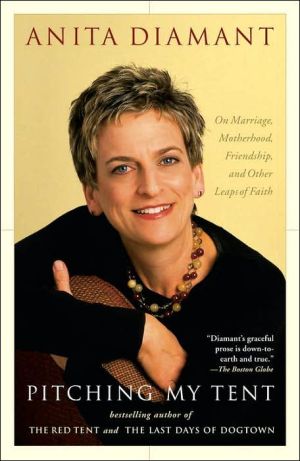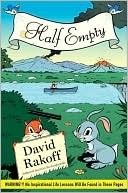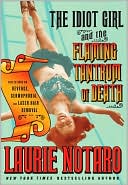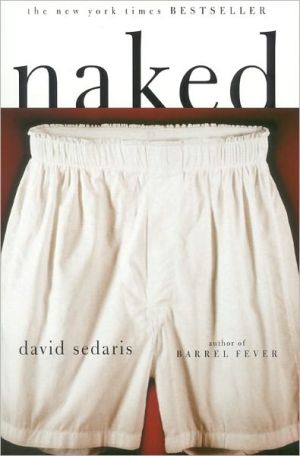Pitching My Tent: On Marriage, Motherhood, Friendship, and Other Leaps of Faith
Before The Red Tent won her international literary acclaim, Anita Diamant was a columnist in Boston. Over the course of twenty years, she wrote essays that reflected the shape and evoution of her life, as well as the trends of her generation. In the end, her musings about love and marriage, birth and death, nature versus nurture, politics and religion — and everything from female friendships to quitting smoking — have created a public diary of the progress of her life that resonated deeply...
Search in google:
Before The Red Tent won her international literary acclaim, Anita Diamant was a columnist in Boston. Over the course of twenty years, she wrote essays that reflected the shape and evoution of her life, as well as the trends of her generation. In the end, her musings about love and marriage, birth and death, nature versus nurture, politics and religion — and everything from female friendships to quitting smoking — have created a public diary of the progress of her life that resonated deeply with her readers. Now, Pitching My Tent collects the finest columns of a writer who is a reporter by training and a storyteller by heart, all revised and enriched with new material. Personal, inspiring, and often funny, Pitching My Tent displays the warmth, humor, and wisdom that Diamant's legions of fans have come to cherish.Publishers WeeklyThis collection of short essays, culled primarily from the Boston Globe Sunday Magazine and then reworked, offers a taste of nonfiction from the author of the novels The Red Tent and Good Harbor. Diamant describes these selections, organized around such themes as love and marriage, child rearing, friendship and living a religious life, as "a sort of diary." Some pieces ring with poignancy, such as Diamant's memorial to her friend David. "I wish," she writes after she leaves the cemetery before David's casket is lowered, "I had stayed to see the workmen come with their truckload of soil that would tuck him in the earth. I would have added my flower to that blanket, burying him just a little." Other selections are less appealing, such as the one on witnessing a four-alarm fire and another on teachers and sexual harassment. The book's strength lies in its woman-to-woman conversational tone, especially in the opening section about married life and its dark side. "In my more rational moments," Diamant writes, "I understand that nagging is not only unattractive but also a total waste of energy. Jim [Diamant's husband] is never going to (a) clear out his piles of magazines, (b) pinch pennies, or (c) give his lungs and heart a break from nicotine just because of anything I say." Diamant's fans will relish "Midrash-or Not," which answers the question of whether The Red Tent is really Bible commentary. Taken together, these morsels will make a tasty snack for Diamant's admirers. Agent, Amanda Urban. (Oct. 2) Forecast: The staggering success of Diamant's previous works and a jacket photo of the author looking casual and approachable will attract female browsers, although it's unlikely this will approach Tent-like success. Copyright 2003 Reed Business Information.
Introduction\ Before The Red Tent, before Good Harbor, before and during six books on contemporary Jewish life, I was a columnist.\ I wrote essays about friendship and fashion, about marriage and electoral politics, about abortion, lingerie, situation comedies, birth, death, God, country, and my dog. I covered the waterfront and the supermarket, my synagogue, the waiting room outside the intensive care unit, and my own kitchen table.\ I did this over the course of twenty years for publications that included a weekly newspaper with a mostly twenty-something readership, and later for a Sunday-magazine audience of millions. I wrote for food lovers in a New England magazine, for the parents of young children in a national publication, and for an international Jewish audience in an on-line magazine. Most of the time, my assignment was weekly; sometimes, it was monthly.\ My job was to report on the events of the day and the changes under my own roof. The challenge was to pay closer-than-average attention and then shape my experiences and reactions into entertaining prose that rose above the level of my own navel. It was more than a great job — it was a meaningful job.\ This collection, culled from those publications and years, turns out to be a sort of diary. It includes musings about the contents of my refrigerator as well as reflections about the most important decisions of my life. To divorce and marry again. To have a child. To live a Jewish life.\ I suppose it's a measure of how much the world has changed that what once seemed like "edgy" choices now seem fairly mainstream. But at the time, I was thinking and doing things that were simply unimaginable for women at any other period in human history. Having been born female, white, and middle class in the United States, in the middle of the twentieth century, meant the women's movement happened to me, in me, for me. It meant that it was highly unlikely that I would die in childbirth, and it meant that I could teach my daughter to speak in her own voice. It meant I could love my work and love my family. And it meant that there was an audience for what I had to say about the trials and joys of this girl's life.\ Actually, the audience was the great, unexpected gift of the assignment because they wrote back. A few said, "No way," and "How dare you?" But many more said, "Me, too," and "Thanks."\ We connected — my readers and I — because we were trying something entirely new. We were not just tinkering around the edges, adjusting our "roles" as women and men. We were reinventing the female psyche and soul, which of course required a radical recasting of the male. We're still at it, too, and with more confidence, wisdom, and resources every year. That our daughters and sons are blasé about this transformation is a measure of our success.\ Looking back through these essays, reflecting on the reflections, is a lot like leafing through the family photo album. I stop and exclaim over the difference between my daughter then (kindergarten) and my daughter now (college). The changes in me are not quite as photogenic, but I think I've become kinder and more patient. I sure hope so.\ My tent is filled with friends and songs and books and memories. My tent — and I hope yours, too — is filled with blessings. Come see.\ Copyright © 2003 by Anita Diamant
IntroductionLove, Marriage, Baby CarriageThe Kiss5Religious Fanatics11Why Marry?15Blast Offf19Nagging24Truce and Consequences28Grief, Dispossessed32Airing It Out36Bedtime Story41Fireflies44My One and OnlyOne55Nursing a Dream59Tender Triangle63Artful67Reading Material70Learning to Let Go74Beach Beacon77Dear Emilia80The Mother's Bat Mitzvah Speech83Columbine86Friday Night at the Crossroads89The Good ShipSide by Side97Girlfriends, in Particular101With a Friend in Mourning104A Four-way Debate107Widening the Circle110To Sir, with Love113Dogs and Katz116Time ZonesStraddling the Calendar125Rosh Hashanah128The Sukkah Next Door132Assimilating Thanksgiving135Christmas Lessons138Ha-Ha-Hanukkah141Purim Rocks145The Orange on the Seder Plate148Yom HaShoah151Yahrzeit154In the MiddleMidlife, the Beginning161First Flame165Vigil169Time-out173Good-bye176Heaven on Earth179The Communal Route183Home for the SoulAleph-Bet191Reforming194My Teacher198Joyful Noise201Meeting Adjourned204Midrash - or Not207Living Waters211Community217Acknowledgments221
\ Publishers WeeklyThis collection of short essays, culled primarily from the Boston Globe Sunday Magazine and then reworked, offers a taste of nonfiction from the author of the novels The Red Tent and Good Harbor. Diamant describes these selections, organized around such themes as love and marriage, child rearing, friendship and living a religious life, as "a sort of diary." Some pieces ring with poignancy, such as Diamant's memorial to her friend David. "I wish," she writes after she leaves the cemetery before David's casket is lowered, "I had stayed to see the workmen come with their truckload of soil that would tuck him in the earth. I would have added my flower to that blanket, burying him just a little." Other selections are less appealing, such as the one on witnessing a four-alarm fire and another on teachers and sexual harassment. The book's strength lies in its woman-to-woman conversational tone, especially in the opening section about married life and its dark side. "In my more rational moments," Diamant writes, "I understand that nagging is not only unattractive but also a total waste of energy. Jim [Diamant's husband] is never going to (a) clear out his piles of magazines, (b) pinch pennies, or (c) give his lungs and heart a break from nicotine just because of anything I say." Diamant's fans will relish "Midrash-or Not," which answers the question of whether The Red Tent is really Bible commentary. Taken together, these morsels will make a tasty snack for Diamant's admirers. Agent, Amanda Urban. (Oct. 2) Forecast: The staggering success of Diamant's previous works and a jacket photo of the author looking casual and approachable will attract female browsers, although it's unlikely this will approach Tent-like success. Copyright 2003 Reed Business Information.\ \ \ \ \ Library JournalBefore Diamant's best-selling novel The Red Tent and her six collections on contemporary Jewish life, she was a columnist for the Boston Globe. Her job was "to report on the events of the day and changes under [her] own roof," with the goal of using her experiences to reflect trends. In writing about topics as seemingly diverse as friendships, marriage, birth, death, her dog, electoral politics, abortion, lingerie, situation comedies, God, and country, Diamant connected with her audience by tapping into the zeitgeist. Organized into six parts, this memoir includes sections on love and marriage, mother and child, friendships, the challenges of balancing a secular and religious calendar, midlife, and what it means to embrace Judaism. Because Diamant (like her readers) was "reinventing the female psyche and soul," the essays she has included here are deeply personal and, admittedly, "a sort of diary." The result is a humorous, honest, and friendly collection impossible not to love. Highly recommended for all public libraries. [Previewed in Prepub Alert, LJ 6/1/03.]-Pam Kingsbury, Florence, AL Copyright 2003 Reed Business Information.\ \








